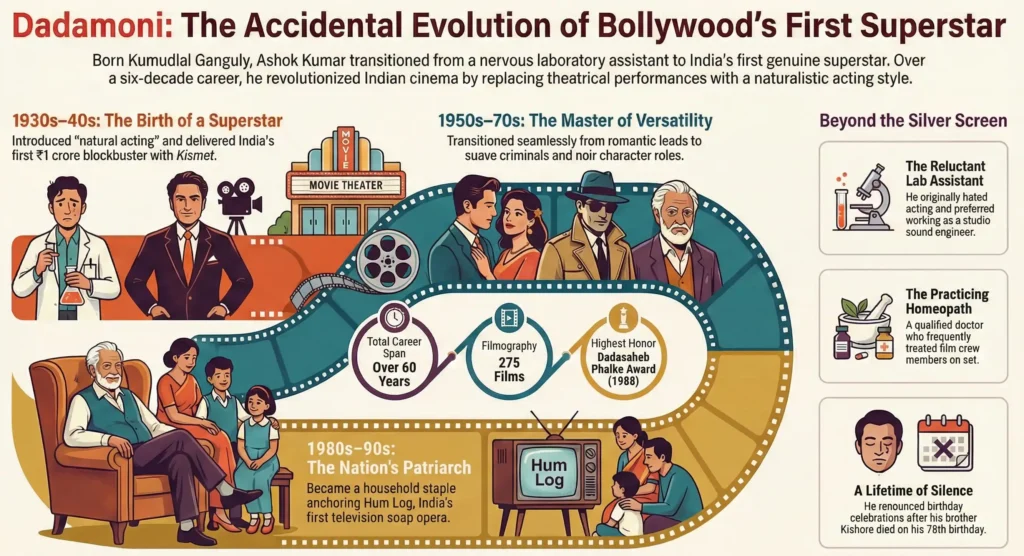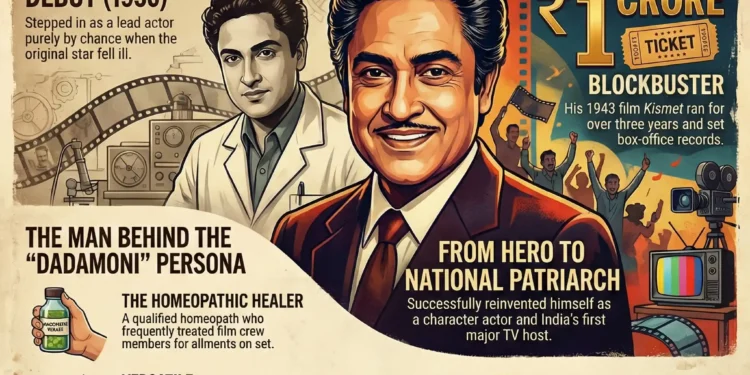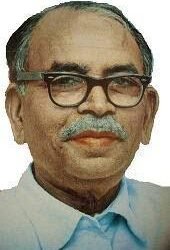Ashok Kumar, born Kumudlal Ganguly in 1911, was a pioneer of Indian cinema who transitioned from a lab assistant to the industry's first superstar. His accidental entry into acting in 1936 led to a career spanning over six decades and 275 films. Renowned for introducing a natural style of acting to a theatrical era, he delivered the first major blockbuster, Kismet (1943). Beyond the screen, he was a mentor, a painter, and a homeopath. Honored with the Padma Bhushan and the Dadasaheb Phalke Award, his influence remains etched in the DNA of Indian storytelling.| Attribute | Details |
| Full Name | Kumudlal Kunjilal Ganguly |
| Screen Name | Ashok Kumar (Dadamoni) |
| Date of Birth | October 13, 1911 |
| Birthplace | Bhagalpur, Bengal Presidency (now Bihar), India |
| Date of Death | December 10, 2001 |
| Profession | Actor, Producer, Singer, Painter, Homeopath |
| Debut Film | Jeevan Naiya (1936) |
| Notable Works | Achhut Kannya, Kismet, Mahal, Chalti Ka Naam Gaadi, Pakeezah, Hum Log |
| Key Awards | Dadasaheb Phalke Award (1988), Padma Bhushan (1999), National Film Award for Best Actor |
| Spouse | Shobha Devi |
| Siblings | Kishore Kumar, Anoop Kumar, Sati Devi |
Early Life: A Lawyer in the Making

Ashok Kumar was born into a distinguished Bengali Brahmin family in Bhagalpur. His father, Kunjlal Ganguly, was a lawyer, and his mother, Gouri Devi, was a homemaker. As the eldest of four siblings—including the future legends Kishore Kumar and Anoop Kumar—he bore the weight of family responsibility early on. Raised in a disciplined household rich in culture, young Kumudlal (Ashok) initially dreamed of following his father’s footsteps into law, completely unaware that his destiny lay in the glimmering world of cinema.
6 Unfoldings in the Subrahmanyan Chandrasekhar Biography
The Accidental Debut
Fate took a sharp turn when he joined Bombay Talkies, one of India’s pioneering film studios. Interestingly, he didn’t join as an actor but as a laboratory assistant and later a sound engineer, fascinated by the technical side of filmmaking. His entry into acting was pure serendipity; when the lead actor of Jeevan Naiya (1936) fell ill just before production, the studio head asked a nervous Ashok to step in. Despite his initial hesitation and lack of training, he accepted, marking the beginning of an era.
Rise to Superstardom
His debut was quickly followed by the social reform drama Achhut Kannya (1936), where his pairing with Devika Rani became a sensation. However, it was the 1943 film Kismet that cemented his status as India’s first superstar. Playing a charismatic anti-hero—a bold move for that time—the film ran for over three years in Calcutta theaters, a record that stood for decades. Unlike the theatrical, exaggerated acting style prevalent then, Ashok Kumar introduced a method that was subtle, natural, and relatable, influencing generations of actors who followed.
10 Remarkable Facts About Meghnad Saha Life and Achievements
Versatility and Reinvention
Ashok Kumar was never one to be typecast. He effortlessly transitioned from the romantic hero of the 40s to the suave criminal in Jewel Thief, and later to the benevolent patriarch in films like Khubsoorat. He also found immense success on the small screen, famously anchoring India’s first soap opera, Hum Log, where his concluding monologues became a cultural staple.
The Human Side
Beyond the arc lights, Dadamoni was a man of diverse talents. He was an avid painter and a practicing homeopath who often treated friends and colleagues. His personal life, however, carried the weight of tragedy; after the untimely death of his beloved youngest brother, Kishore Kumar, on Ashok’s 76th birthday, he famously stopped celebrating the occasion forever.
7 Incredible Facts in the Satyendra Nath Bose Biography
Quick Comparison: Evolution of a Legend
| Phase | Role Type | Key Films | Impact |
| 1930s-40s | Romantic Lead / Anti-Hero | Achhut Kannya, Kismet | Established the “Natural Acting” school; created the first “Blockbuster”. |
| 1950s-60s | Character Actor / Mystery | Mahal, Jewel Thief, Bandini | Proved versatility in noir and suspense genres. |
| 1980s-90s | Patriarch / TV Host | Khubsoorat, Hum Log | Became the grandfather figure of the nation. |
Curious Indian Fast Facts
- The Unwanted Actor: Ashok Kumar actually hated acting initially and wanted to go back to being a technician. He reportedly felt embarrassed by his first few takes.
- The Record Breaker: His film Kismet (1943) was the first Indian movie to gross ₹1 crore at the box office.
- The Birthday Tragedy: He shared his birthday (October 13) with his brother Kishore Kumar’s death anniversary, leading him to renounce birthday celebrations in his later years.
- Multi-Talented: Apart from acting, he sang hits like “Koi Humdum Na Raha” decades before Kishore Kumar sang a cover of it.
- Medical Man: He was a qualified homeopath and was known to carry his medicine box to film sets, treating crew members for minor ailments.
Conclusion
Ashok Kumar was more than just a cinema icon; he was an institution. From a shy laboratory assistant to the “Dadamoni” of Bollywood, his life defied the conventional path to stardom. He proved that greatness isn’t always about chasing the spotlight, but about mastering the craft with humility and grace. Today, his legacy lives on not just in his films, but in the naturalistic performance style he pioneered—a gift that continues to shape Indian cinema.
8 Fascinating Facts in the Homi Jehangir Bhabha Biography
If you think you have remembered everything about this topic take this QUIZ
Results
#1. What was Ashok Kumar’s real birth name?
#2. Before becoming an actor, in what capacity did Ashok Kumar join the Bombay Talkies studio?
#3. Which 1943 film starring Ashok Kumar is considered India’s first major blockbuster, running for over three years?
#4. Ashok Kumar famously anchored and delivered concluding monologues for which pioneering Indian soap opera?
#5. Besides acting and painting, Ashok Kumar was a qualified practitioner of which system of medicine?
#6. Why did Ashok Kumar stop celebrating his birthday (October 13) after 1987?
#7. Which film marked Ashok Kumar’s acting debut in 1936?
#8. Ashok Kumar was the eldest brother of which other legendary Bollywood icon?
Who was Ashok Kumar famously known as?
He was affectionately known as “Dadamoni,” which translates to “Elder Brother” in Bengali.
What was Ashok Kumar’s first film?
His debut film was Jeevan Naiya (1936), produced by Bombay Talkies.
Was Ashok Kumar related to Kishore Kumar?
Yes, Ashok Kumar was the eldest brother of the legendary singer and actor Kishore Kumar.
What is the significance of the movie Kismet?
Released in 1943, Kismet was the first blockbuster in Indian cinema history and ran for over three years in a single theater in Kolkata.
Did Ashok Kumar receive the Dadasaheb Phalke Award?
Yes, he was honored with the Dadasaheb Phalke Award, India’s highest award in cinema, in 1988.
Read More: https://curiousindian.in/ilaiyaraaja-june-1943-present/








